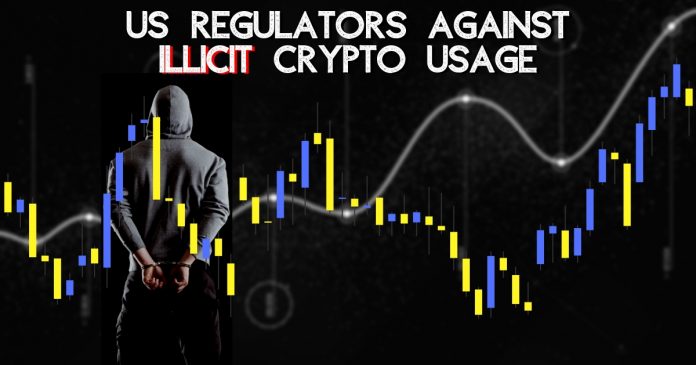In a joint statement, the chairmen of the three primary financial regulators in the United States affirmed their position against unlawful activities involving digital assets.
No illicit cryptocurrency usage is welcome. Such a statement comes from Heath Tarbert, Chairman of the U.S. Commodity Futures Trading Commission (CFTC). Kenneth A. Blanco, Director of the Financial Crimes Enforcement Network (FinCEN). Also, Jay Clayton, Chairman of the U.S. Securities and Exchange Commission (SEC).
The joint statement was issued to remind persons engaging in activities involving cryptocurrency of their anti-money laundering (AML) obligations. As well as their countering financing of terrorism (CFT) duties. Both are part of the Bank Secrecy Act (BSA).
What does this mean?
The AML/CFT obligations apply to entities that the BSA terms as financial institutions. Note, these are futures commission merchants and introducing brokers obligated to register with the CFTC. Also, there are money services businesses (MSBs) as defined by FinCEN, and broker-dealers and mutual funds that register under the SEC.
Additionally, the AML/CFT obligations carry the requirement to establish and implement an effective anti-money laundering program (AML Program). They also ask to ensure recordkeeping and reporting on suspicious activity reporting (SAR) requirements.
Opinions of the financial regulators
The U.S. Commodity Futures Trading Commission (CFTC) Chairman, Kenneth A. Blanco addressed the mission of the CFTC. He said: “The CFTC’s mission is to promote the integrity, resilience, and vibrancy of the U.S. derivatives markets. Thus, the need for sound regulation”. Also, Kenneth pointed out that in implementing the mission key participants in the market are regulated. “In advancing that mission, the CFTC regulates key participants in the derivatives markets, including boards of trade, futures commission merchants. Thus, introducing brokers, swap dealers, major swap participants, and retail foreign exchange dealers. As well as, commodity pool operators, and commodity trading advisors under the CEA.”
Kenneth Blanco, Director of the Financial Crimes Enforcement Network (FinCEN) pointed out the mandated obligations of the US financial institutions. “The FinCEN mandates certain controls, reporting, and recordkeeping obligations for U.S. financial institutions. Accordingly, the BSA and its implementing regulations set forth the regulatory obligations that generally apply to financial institutions. Thus, applying to the AML Program, recordkeeping, and reporting requirements,” he added.
Jay Clayton, Chairman of the U.S. Securities and Exchange Commission (SEC) also commented. “Market participants receiving payments or engaging in other transactions in digital assets should consider such transactions to present similar or additional risks. Thus, including AML/CFT risks, presented by transactions in cash and cash equivalents.





























No surprise. At least they are taking crypto seriously for a change. But, we are still somewhere in the middle of the learning curve.